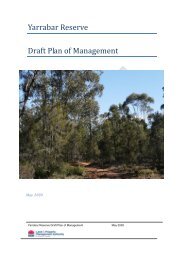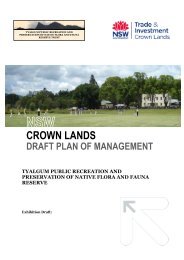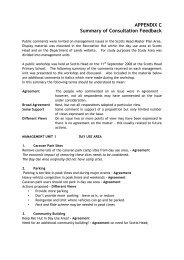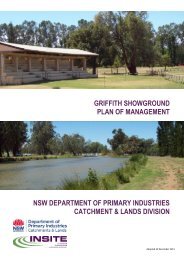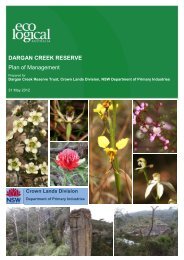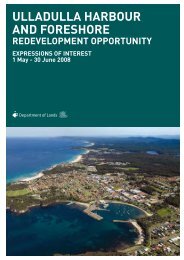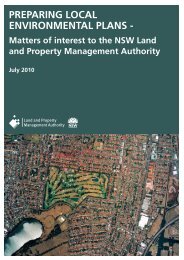Enmore Park Plan of Management - Land
Enmore Park Plan of Management - Land
Enmore Park Plan of Management - Land
- No tags were found...
You also want an ePaper? Increase the reach of your titles
YUMPU automatically turns print PDFs into web optimized ePapers that Google loves.
URBAN FORESTRY AUSTRALIA - TREE MANAGEMENT & CONSULTING ARBORICULTURISTSSelf corrected Lean which has naturally corrected to a vertical orientation by the development <strong>of</strong>reaction wood.Suppressed In crown class, trees which have been overtopped and whose crown developmentis restricted from above.Taper Relative change in diameter with length; reflects the ability <strong>of</strong> the stem or branch to evenlydistribute stress along its length.Topping or heading is a pruning practice that results in removal <strong>of</strong> terminal growth leaving a cutstub end. Topping causes serious damage to the tree.Tree Protection Zone (TPZ), generally the minimum distance from the center <strong>of</strong> the tree trunkwhere protective fencing or barriers are to be installed to create an exclusion zone. The TPZsurrounding a tree aids the tree’s ability to cope with disturbances associated with constructionworks. Tree protection involves minimising root damage that is caused by activities such asconstruction. Tree protection also reduces the chance <strong>of</strong> a tree’s decline in health or death andthe possibly damage to structural stability <strong>of</strong> the tree from root damage.To limit damage to the tree, protection within a specified distance <strong>of</strong> the tree’s trunk must bemaintained throughout the proposed development works. No excavation, stockpiling <strong>of</strong> buildingmaterials or the use <strong>of</strong> machinery is permitted within the TPZ.The methodology adopted by Urban Forestry Australia for determining a tree’s TPZ is based onMatheny & Clark’s guidelines, as modified from the British Standards Institute 1991. It refers tothe optimal tree protection zones for trees <strong>of</strong> ‘average to excellent vigour’.o All calculations for TPZ’s using the Matheny and Clark guidelines have been converted tometric figures.ooTrees <strong>of</strong> poor vigour are generally not considered for retention under this guideline.Canopy spreads displayed on the survey are not accurately shown in many cases. Wherea TPZ is displayed as a smaller diameter than the crown dripline, it is to be given that theTPZ is to be extended to the crown dripline.SAFE USEFUL LIFE EXPECTANCY (SULE)In a planning context, the time a tree can expect to be usefully retained is the most importantlong-term consideration. SULE i.e. a system designed to classify trees into a number <strong>of</strong>categories so that information regarding tree retention can be concisely communicated in a nontechnicalmanner.SULE categories are easily verifiable by experienced personnel without great disparity.A tree’s SULE category is the life expectancy <strong>of</strong> the tree modified first by its age, health,condition, safety and location (to give safe life expectancy); then by economics (i.e. cost <strong>of</strong>maintenance - retaining trees at an excessive management cost is not normally acceptable); andfinally, effects on better trees, and sustained amenity (i.e. establishing a range <strong>of</strong> age classes in alocal population).SULE assessments are not static but may be modified as dictated by changes in tree health andenvironment. Trees with a short ULE may at present be making a contribution to the landscape,but their value to the local amenity will decrease rapidly towards the end <strong>of</strong> this period, prior tothem being removed for safety or aesthetic reasons.For details <strong>of</strong> SULE categories see Appendix B, modified from Barrell 2001.Arboricultural Audit and Assessment– <strong>Enmore</strong> <strong>Park</strong>, Marrickville. January, 2008 10 <strong>of</strong> 42



